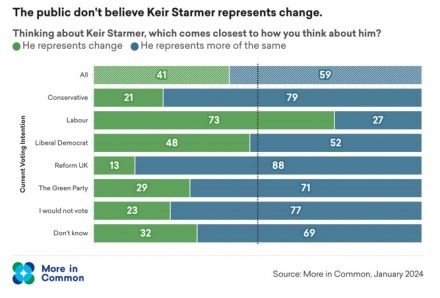
Until the middle of last week the question on the lips of those of us who follow public opinion closely was whether we’d underestimated how low the Conservatives could go.
The year started not with a widely anticipated Conservative recovery – but more leadership plots, gaffes from the PM, while lower inflation and tax cuts haven’t, at least yet translated into any sort of feel good factor. The result? An opinion poll lead for Labour approaching 1997 levels.
A focus group I ran in Wellingborough this time last week with 2019 Conservative voters was without doubt one of the most grim for the Government I’ve run. The participants weren’t even angry anymore, but instead resigned to the Government’s failures and waiting for it to come to an end. As one woman put it, ‘They’re trying their best, but I just don’t think they’re any good…give someone else a chance”.
But last Thursday, after much torturous and public deliberation, came Labour’s confirmation that the £28 billion price tag for their green investment plan would be dropped. It was hard to read public opinion and not conclude the policy showed far more upside than downside for Labour – in fact, our polling found it was the second most popular manifesto policy with likely Labour voters.

The green U-turn risks reinforcing voter questions over Labour’s vision
Too often it feels like Westminster hasn’t caught up with public expectations on climate and the environment – an issue which regularly ties concern about levels of migration as a top issue for the public, even though the latter gets far more air time.
But the merits of this now denuded policy aren’t what most risk damaging Labour – instead, the bigger risk is that the weakening of Labour’s offer reinforces voters’ pre-existing concerns that Labour don’t have a positive vision of their own.
I cannot tell you how often in focus groups people will tell me some version of ‘I’m done with the Tories, I want someone new, but I don’t know what Keir Starmer and Labour stand for other than not being the Conservatives’. That sentiment is borne out in polling too: three in five Britons say they don’t know what Keir Starmer stands for and the same amount think he represents ‘more of the same’.
And the decision to u-turn on green investment came hot on the heels of another u-turn with Rachel Reeves’ announcement that a future Labour Government would not reinstate the cap on bankers bonuses. That Labour wants to woo business with pledges not to hike corporation tax is understandable. But, the politics of taking the side of bankers – rivalled in their unpopularity only by politicians and energy giants – seems harder to fathom.

The risk from Rochdale goes beyond the remarks themselves
Had it not been for the emergence of deeply offensive comments by Labour’s now-former candidate in Rochdale, Labour’s week of woes might have been swept up by the latest Conservative row. The risk from Rochdale goes beyond the remarks themselves.
While Labour clearly has work to do to tackle anti-semitism, there is good evidence that current Labour voters think the party is making progress, and only four per cent of those intending to vote Labour cite worries about anti-semitism as a potential hesitation.
The damage from Rochdale sits squarely with Labour’s response. To those of the electorate who have heard about the episode, what will have cut through is that the party took two days to sack someone who was clearly unfit to be an MP.
So, where has Labour’s bad week left them in the eyes of public opinion? On Tuesday, our poll found Labour on 40%, down three points – and at the lowest level they’ve been in the past year, and with an 11 point lead over the Conservatives. A Savanta poll found a bigger Labour fall of 5 points, with the Labour lead down to 12. Both surveys closed before the Rochdale scandal properly bed in, but after the green U-turn.
At the same time, two other pollsters who were in the field over the same period – Deltapoll and Redfield and Wilton – found Labour’s lead up to 18 and 25 points respectively. It is far too early to know if there has been a real change in public opinion or if this is all just noise – only over the next few weeks will we see whether Labour faces any permanent damage.
The fundamentals of Tory struggles haven’t changed
Today, the narrative could change very quickly. The Tories face both two likely by-election losses and the risk of Reform UK having a good night. More importantly, the structural drivers of the Tories’ struggles haven’t changed.
The cost of living crisis, NHS woes and widespread frustration on issues like crime and immigration means Labour can very easily win by default, even if they aren’t loved, and as it stands that is what they are on course to do.
Perhaps the sole beneficiary of Labour’s missteps was Rishi Sunak himself. While it is unlikely the past week will have saved his party from defeat in the election it might have saved his premiership until then. Labour’s woes give the Tories a morale boost and helps keep wayward backbenchers in line.
But the last week should be a warning to Labour that they have reached peak ‘not Tory’. Even if Labour do not need much more to get the keys to Number 10, they will need it for when things – inevitably – go wrong in office.
And to prepare for that, Labour’s machine needs to get better at setting out its stall, fast-forwarding from an outdated obsession with the politics and tactics of the 1990s, and being clearer about the change a Labour government would offer in the somewhat bleaker environment of the 2020s.




More from LabourList
‘Labour is being badly misled on housing’
Reeves bets on patience over populism
‘Energy efficiency changes must work for older private renters’